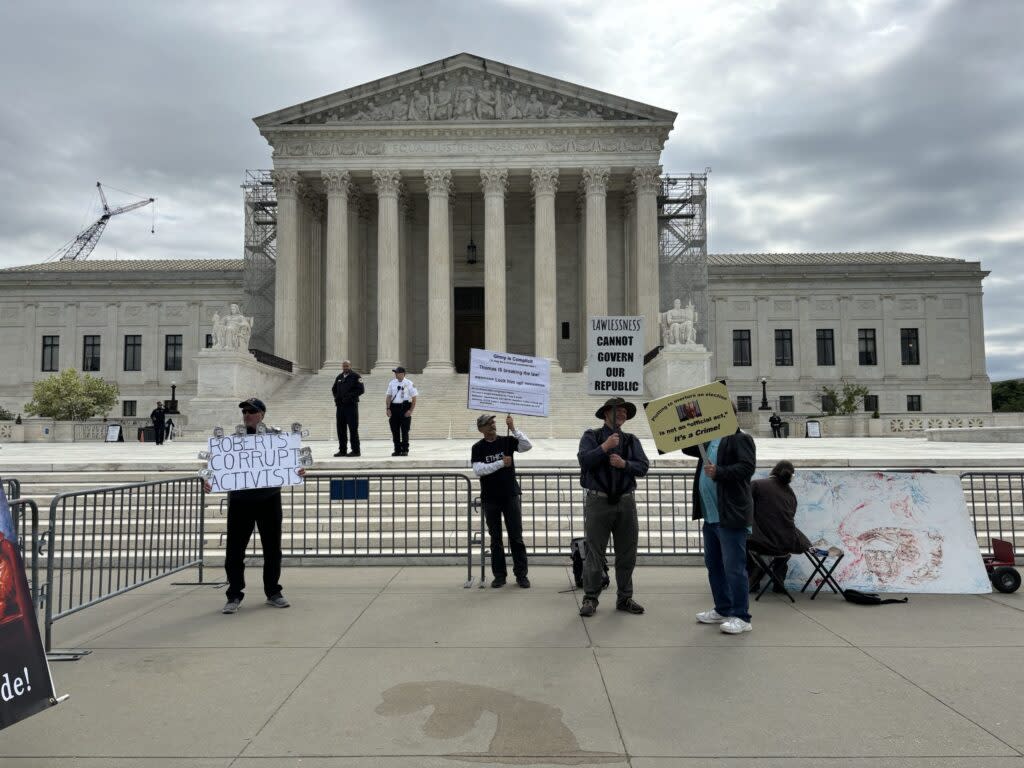Biden urges term limits for U.S. Supreme Court justices, new ethics rules

- Oops!Something went wrong.Please try again later.
- Oops!Something went wrong.Please try again later.
Protesters outside the U.S. Supreme Court on April 25, 2024, during oral arguments on a presidential immunity case. (Jane Norman/States Newsroom)
WASHINGTON — Before he leaves the Oval Office in January, President Joe Biden wants to see Congress take up a constitutional amendment restoring criminal liability for U.S. presidents in response to the recent Supreme Court decision granting the chief executive broad immunity.
Biden announced the “Not Above the Law Amendment” Monday along with endorsing other changes for the nation’s highest bench, potentially setting the tone and focus for the Democrat’s final months in office after he exited the 2024 race in favor of Vice President Kamala Harris.
The proposal, released by the White House without text and detailed by Biden in a Washington Post op-ed, comes as public trust in the high court flags after recent ethics scandals and the overturning of Roe v. Wade that bucked popular opinion on abortion.
Biden is urging Congress to pass 18-year term limits for justices, with a president appointing a new justice every two years, and to approve enforceable conduct and ethics rules that would require disclosure of gifts, bar public political activity and ensure recusal from cases where a justice or their spouse has a financial or political stake.
Biden’s plan to “restore faith” in the nation’s highest court will likely hit a roadblock in the Republican-led U.S. House and in the Senate, where Democrats hold a slim edge and any reforms could struggle to gain the necessary 60 votes. A constitutional amendment would also require passage in three-fourths of the states.
U.S. House Speaker Mike Johnson called Biden’s proposal “dead on arrival.”
Writing in the Washington Post op-ed, Biden said a lack of legal repercussions for former President Donald Trump’s role in the violent Jan. 6, 2021, attack on the U.S. Capitol, intended to stop the peaceful transfer of power from one elected administration to another, is “only the beginning.”
“The only limits will be those that are self-imposed by the person occupying the Oval Office,” he wrote.
He also referenced recent behavior from the court uncovered by ProPublica’s investigative journalists — including gifts and luxury travel given to the justices from political donors — as cause for alarm.
“What is happening now is not normal, and it undermines the public’s confidence in the court’s decisions, including those impacting personal freedoms. We now stand in a breach,” Biden wrote.
GET THE MORNING HEADLINES DELIVERED TO YOUR INBOX
Biden is expected to speak on his plan Monday afternoon when he commemorates the 60th anniversary of the Civil Rights Act at the Lyndon B. Johnson Library in Texas.
Public Citizen, a group that advocates for changes at the Supreme Court, issued a statement Monday praising Biden’s proposal.
“The dramatic drop in public confidence in the Supreme Court both undercuts the Court’s legitimacy and endangers the legitimacy of the judicial branch as a whole,” wrote Lisa Gilbert, the organization’s co-president. “It is also critical that we undo the damage caused by the overreaching SCOTUS decision in the presidential immunity case and ensure that no person — including the president — is above the law.”
Johnson panned Biden’s announcement as a “radical overhaul” and “logical conclusion to the Biden-Harris Administration and Congressional Democrats’ ongoing efforts to delegitimize the Supreme Court.”
“It is telling that Democrats want to change the system that has guided our nation since its founding simply because they disagree with some of the Court’s recent decisions,” the Louisiana Republican said in a statement Monday.
But various acts of Congress have changed the court since the nation’s founding, including the number of seats on the bench, which have ranged from five to 10. The number of seats on the court was fixed at nine shortly after the Civil War, according to the court’s historical information that details the changes. In 1925, an act granted the justices the power to decide whether to hear a case, also known as certiorari.
The Republican National Committee issued a statement accusing Biden’s plan of being “Kamala’s scheme to pack the Supreme Court with far-left, radical judges who will render decisions based on politics, not the law — and insulate her dangerously liberal policy positions from scrutiny if she’s elected.”
Democrats decry the court
Efforts to pass an enforceable code of conduct at the Supreme Court are already underway among Democratic lawmakers.
Reps. Jamie Raskin of Maryland, the top Democrat on the GOP-led House Committee on Oversight and Accountability, and Alexandria Ocasio-Cortez of New York, another Democratic committee member, introduced legislation last month that would prohibit justices from receiving gifts valued over $50, according to their offices.
The two lawmakers hosted a roundtable in early June excoriating the court after Chief Justice John Roberts refused to take action when the New York Times revealed that an upside-down U.S. flag — a sign of protest — flew outside Justice Samuel Alito’s Virginia home shortly after the Jan. 6 riot.
House progressives unsuccessfully urged Alito to recuse himself from two cases related to Jan. 6, including Trump’s appeal for immunity from federal election subversion charges.
A Supreme Court ethics bill sponsored by Rhode Island’s Democratic Sen. Sheldon Whitehouse advanced out of the Senate Committee on the Judiciary along party lines a year ago but has not received a floor vote.

